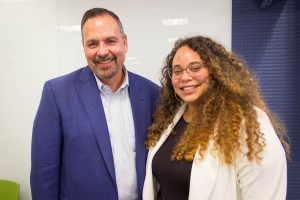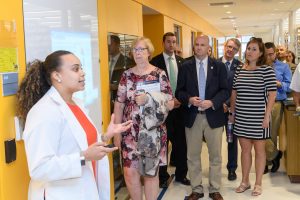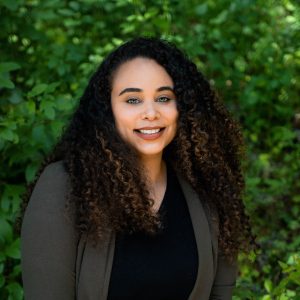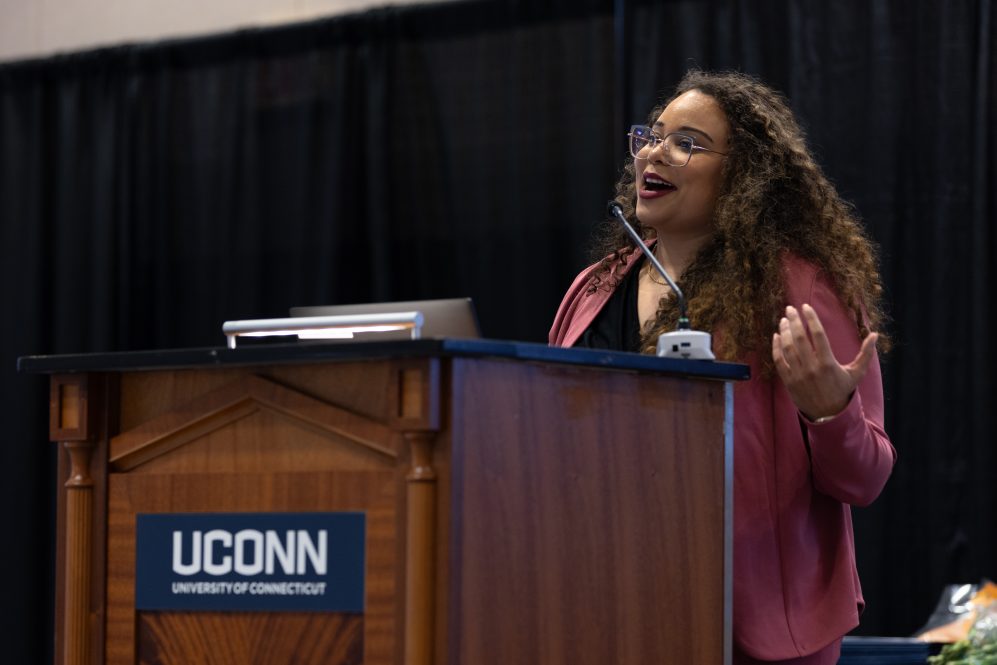Stephany Santos, the new Vergnano Endowed Chair for Inclusion at UConn’s College of Engineering, feels like she’s been preparing for this role since she set foot on UConn’s campus in 2008, as an undergraduate preparing to study mechanical engineering.
Prior to her first summer at UConn, she was a participant in the BRIDGE program, which is a transitionary preparation program designed to support the success of incoming first-year students that are underrepresented in engineering.
The BRIDGE program, then run out of the Engineering Diversity Program led by Kevin McLaughlin, became a hallmark of her identity and purpose as an engineering student and leader at UConn, says Santos ’12 (ENG) ’20 Ph.D. She volunteered for every program offered by the Engineering Diversity Program, from Multiply Your Options, a program designed to inspire 8th-grade girls to think about STEM, to the Northeast Regional Science Bowl, the largest regional competition in the country for high school students competing quiz-bowl-style in STEM questions.
During this period Santos also helped found UConn’s student organization Engineering Ambassadors. This is an organization that supports K-12 teachers and education systems by broadening understanding and access to engineering, and by exploring how engineers can change the world for good. These programs, Santos explains, are foundational in creating confidence academically, connections psychosocially and inspiration professionally.
Creating the Vergnano Institute for Inclusion

An initial $3 million gift in 2021 from Mark and Betsy Vergnano expanded the capacity and scope to transform EDOC into the Vergnano Institute for Inclusion (VII). Their philosophy, Santos explains, is that anyone is capable of engaging and and thriving in STEM, no matter their background, identities, experiences or resources. The Institute provides scholarships, mentoring programs and leadership and professional-development resources. The Vergnano’s then made another $3 million gift this fall to establish the Vergnano Endowed Chair.
The Institute’s mission, Santos emphasizes, is to create equitable and inclusive environments for anyone interested in engineering and STEM disciplines and careers. “People can prosper and persist no matter what challenges they face,” she stresses, “but often need help opening doors that might not have been opened or approachable for them in the past. Our goal is to provide additional structure and support to help people succeed at whatever they choose.”
As an example, she cites the Institute’s Sophomore Summer program, which has been designed for students who are just finishing up their first year. This cohort, she explains, have typically been seen as too young or inexperienced to gain access to internships and other training, but are perfect candidates for skill-formation, exploration and identity-building in ways that could catalyze them in future internships or research roles.
The three-week program, offered in late May and early June, is inspired by BRIDGE, and similarly includes an emphasis on low-stakes academic foundation-building, particularly for physics and calculus. The program then adds in technical skill-building such as computer aided design, and Excel skills, project management and more. It also embeds students in a practicum, where participants engage in a longer-term project to be able to learn more about research and industry applications. This year students were able to select between projects that ranged from reviving the UConn Observatory using image capture of stars, to a collaboration with QuantumCT as an introduction to quantum computing.
Carving out her path at UConn

Santos earned her bachelor’s degree in 2012 in biomedical engineering from UConn. She was named an EAGLES Fellow, pursuing a double degree for her post-graduate work, studying at UConn and at the Politecnico di Milano, in Italy. This led to two MS degrees in mechanical engineering, completed in 2015.
Santos also did volunteer work with the Engineering Diversity and Outreach Center (EDOC), which is the evolution of the Engineering Diversity Program, still led by Kevin McLaughlin. Santos collaborated with McLaughlin, as well as UConn undergraduate student leaders, to create new programs such as SPARK, a residential summer camp for middle school girls that engages students in both STEM and empowerment activities developed and led by undergraduate students.
Santos’s graduate work was supported by multiple fellowships. With the NSF Graduate STEM Fellows in K-12 Education fellowship, her work included time as a mentor and classroom support at Cheney Technical High School in Manchester, Conn. There she helped teach, guide and mentor students in the Computer Aided Design shop. She also received UConn’s Crandall-Cordero Fellowship, and the prestigious Ford Foundation Fellowship.
The Ford Foundation, she says, was passionate about excellence in research and service that supports and uplifts the community. In particular, she adds, it focused on bringing justice and equity to advance humanity, while supporting increased diversity in the nation’s colleges and universities faculties. All of these experiences, she adds, coupled with her sustained commitment as a leader and instructor for the BRIDGE program, helped establish the foundation for her new position. Santos then earned her Ph.D. in biomedical engineering from UConn, in 2020, focused on arthritis research.
Santos joined EDOC in 2020 as associate director, part of a team of three professionals, and became executive director in 2022, overseeing K-12 activities, impact assessment of current and new programs, strategic planning related to equity and belonging, and broader connections in STEM. Under her leadership and advocacy for growth, her team now has grown to seven people, focused on resilience, equity, access and community health. They work with UConn students and faculty, as well as pre-K to grade-12 students, and are supported by like-minded community partners, overseeing 18 programs in Connecticut.
Planning for the future

The Institute, Santos says, collaborates with a variety of partners and organizations at the state and national levels to make sure engineering is inclusive, and is striving to be seen as a thought leader. For example, Santos leverages and brings the Institute’s mission and programming to her work in the Howard Hughes Medical Institute’s Inclusive Excellence 3 initiative. This promotes collaboration among 17 institutions across the country towards systems change.
Santos also is a leader in the NSF Funded Engineering Plus Alliance, and leader for the New England Regional Hub. Other specific goals for the organization, she points out, include working with the CT State Community College system to better collaborate, as well as to help create stronger and more supportive pathways to a four-year engineering degree for those who choose; strengthening programming and collaboration and addressing inequities at UConn’s regional campuses; being a resource for UConn faculty; working with small and large industry partners and minority owned businesses; and remaining student driven.
But underlying everything Vergnano Institute and Inclusion-related, Santos says, is creating an ecosystem of support, inclusivity and belonging. “In this space, we’re striving for love and acceptance, and trying to offer ways to help students of all ages and backgrounds realize their dreams. Our mission,” she adds, “is to make sure every student has an equal chance to prosper.”



